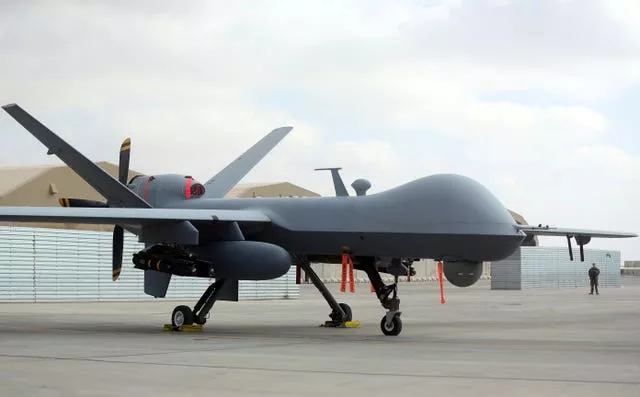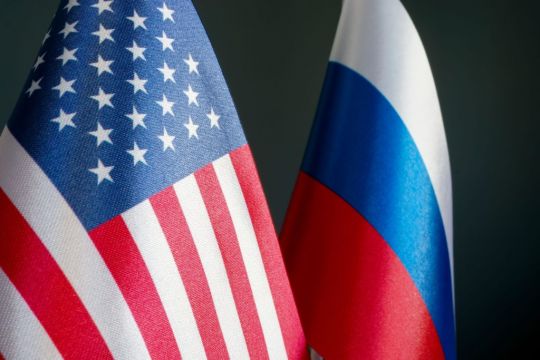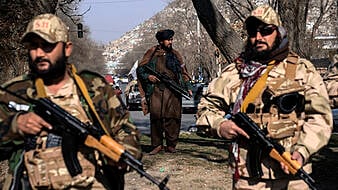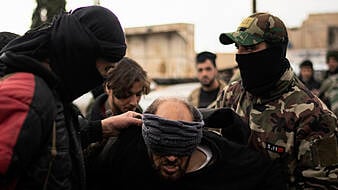A Russian fighter jet struck the propeller of a US surveillance drone over the Black Sea in a “brazen violation of international law”, causing American forces to bring down the unmanned aerial vehicle, the US has said.
Moscow said the US drone manoeuvred sharply and crashed into water following an encounter with Russian fighter jets scrambled to intercept it near Crimea, but insisted its warplanes did not fire their weapons or hit the drone.
The incident, which added to Russia-US tensions over Moscow’s war in Ukraine, appeared to mark the first time since the height of the Cold War that a US aircraft was brought down after an encounter with a Russian warplane.
US President Joe Biden was briefed on the incident by national security adviser Jake Sullivan, according to White House National Security spokesman John Kirby.

He added that US State Department officials would be speaking directly with their Russian counterparts and “expressing our concerns over this unsafe and unprofessional intercept”.
State Department spokesman Ned Price called it a “brazen violation of international law”.
He said the US summoned the Russian ambassador to lodge a protest and the US ambassador to Russia Lynne Tracy has made similar representations in Moscow.
The US European Command said in a statement that two Russian Su-27 fighter jets “conducted an unsafe and unprofessional intercept” of a US MQ-9 drone that was operating within international airspace over the Black Sea.
It said one of the Russian fighters “struck the propeller of the MQ-9, causing US forces to have to bring the MQ-9 down in international waters”.
Prior to that, the Su-27s dumped fuel on and flew in front of the MQ-9 several times before the collision in “a reckless, environmentally unsound and unprofessional manner”, the US European Command said in a statement from Stuttgart, Germany.
“This incident demonstrates a lack of competence in addition to being unsafe and unprofessional,” it added.
US Air Force General James B Hecker, commander of US Air Forces Europe and Air Forces Africa, said that the MQ-9 aircraft was “conducting routine operations in international airspace when it was intercepted and hit by a Russian aircraft, resulting in a crash and complete loss of the MQ-9″.
He added that “in fact, this unsafe and unprofessional act by the Russians nearly caused both aircraft to crash”.
Pentagon spokesman Air Force Brigadier General Pat Ryder said the incident occurred at 7.03am Central European time (0603 GMT) over international waters, and well clear of Ukraine, after the Russian jets had flown in the vicinity of the drone for 30 to 40 minutes.
There did not appear to be any communications between the aircraft before the collision, Brig Gen Ryder added.
The MQ-9 is capable of carrying munitions but Brig Gen Ryder would not say whether it was armed.
The US had not recovered the crashed drone, US Air Forces-Europe said in a statement, and neither had Russia, Brig Gen Ryder said.
He said it appeared the Russian aircraft was also damaged in the collision but the US has confirmed that warplane did land, although Brig Gen Ryder would not say where.
Russia’s Defence Ministry said the US drone was flying near its borders and intruded in the area that was declared off limits by Russia, causing the military to scramble fighters to intercept it.
“As a result of sharp manoeuvre, the US drone went into uncontrollable flight with a loss of altitude” and fell into the water, it said.
“The Russian fighters didn’t use their weapons, didn’t come into contact with the unmanned aerial vehicle, and they safely returned to their base.”
The Russian ambassador to Washington, Anatoly Antonov, described the US drone flight as a “provocation” and argued that there was no reason for US military aircraft and warships to be near Russia’s borders.

Speaking after meeting with US assistant secretary of state for Europe Karen Donfried, Mr Antonov insisted that the Russian warplanes did not use their weapons or hit the American drone.
He added that Moscow wants “pragmatic” ties with Washington, adding that “we don’t want any confrontation between the US and Russia”.
Moscow has repeatedly voiced concern about US intelligence flights close to the Crimean Peninsula, which Russia illegally annexed from Ukraine in 2014.
The Kremlin has claimed that by providing weapons to Ukraine and sharing intelligence information with Kyiv, the US and its allies have effectively become engaged in the conflict.
Mr Kirby emphasised that the incident would not deter the US from continuing their missions in the area.
“If the message is that they want to deter or dissuade us from flying, and operating in international airspace, over the Black Sea, then that message will fail,” Mr Kirby said, adding “that is not going to happen”.
“We’re going to continue to fly and operate in international airspace over international waters,” he said.
“The Black Sea belongs to no one nation.”
The US European Command noted that Tuesday’s incident followed a pattern of dangerous actions by Russian pilots while interacting with US and Allied aircraft over international airspace, including over the Black Sea.
“These aggressive actions by Russian aircrew are dangerous and could lead to miscalculation and unintended escalation,” it warned.
General David Berger, commandant of the Marine Corps, said that this type of collision is his greatest concern, both in that area of Europe as well as in the Pacific.
“Probably my biggest worry both there and in the Pacific is an aggressive Russia or China pilot or vessel captain, or something gets too close, doesn’t realise where they are, and causes a collision,” Gen Berger said, in response to a question at a National Press Club event on Tuesday.
He said that whether an incident is intentional or not, it forces nations’ leaders to try to sort it out quickly from afar.







